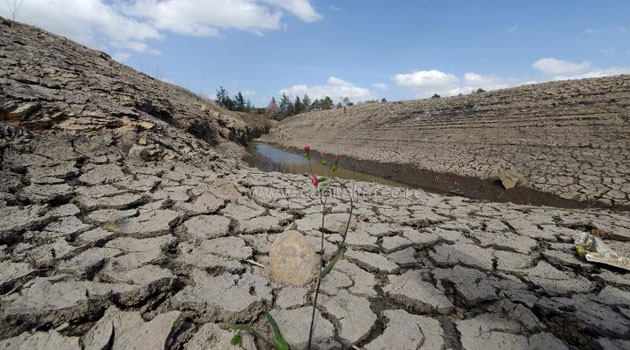
The Los Laureles dam, which supplies with potable water one million inhabitants of the Honduran capital Tegucigalpa, at a critically low level/AFP
Left unchecked, greenhouse gas emissions may cost trillions of dollars in damage to property and ecosystems, and in bills for shoring up climate defences, it said.
The report said the impact of climate change was already being felt and would increase with every additional degree that temperatures rise.
“Increasing magnitudes of warming increase the likelihood of severe, pervasive, and irreversible impacts,” a summary said, in a stark message to policymakers.
The report is the second chapter of the fifth assessment by the Intergovernmental Panel on Climate Change (IPCC), set up in 1988 to provide neutral, science-based guidance to governments.
“It’s a toolkit for managing climate change, but it also provides a framework for understanding, a mindset for understanding climate change and its implications,” Chris Field of the Carnegie Institution, co-chairman of the group of scientists who authored the report, told AFP.
These hefty documents – running to thousands of pages -have a political impact that can resound for years.
The last overview, published in 2007, earned the panel a co-share in the Nobel Peace Prize and unleashed a wave of political action that strived, but failed, to forge a worldwide treaty on climate change in Copenhagen in 2009.
The new document, unveiled in Yokohama after a five-day meeting, gives the starkest warning yet by the IPCC of extreme consequences from climate change, and delves into greater detail than ever before into the impact at regional level.
It builds on previous IPCC forecasts that global temperatures will rise 0.3-4.8 degrees Celsius (0.5-8.6 degrees Fahrenheit) this century, on top of roughly 0.7 Celsius since the Industrial Revolution.
Seas are forecast to rise by 26-82 centimetres (10-32 inches) by 2100.
Warming of around two degrees Celsius over pre-industrial times may cost 0.2-2.0 percent of global annual income, said the new report. UN members have pledged to hammer out a global pact by the end of 2015 to limit warming to 2 C above pre-industrial levels.
The impact amplifies with every degree and beyond 4 C could be disastrous, said the report.
Climate change could drive turbulence and conflict, prompted by migration from newly uninhabitable areas and jockeying for water and food, it said.
“Climate change has a tendency to act as a threat multiplier whatever the current range of stressors is,” said Field.
“There are many things that make people vulnerable, and when you combine a climate shock with these factors, you can have bad outcomes.”
Rainfall patterns will be disrupted, resulting in a significantly higher flood risk, especially for Europe and Asia – and magnified drought risks will add to water stress in arid, heavily populated areas, the report says.









































